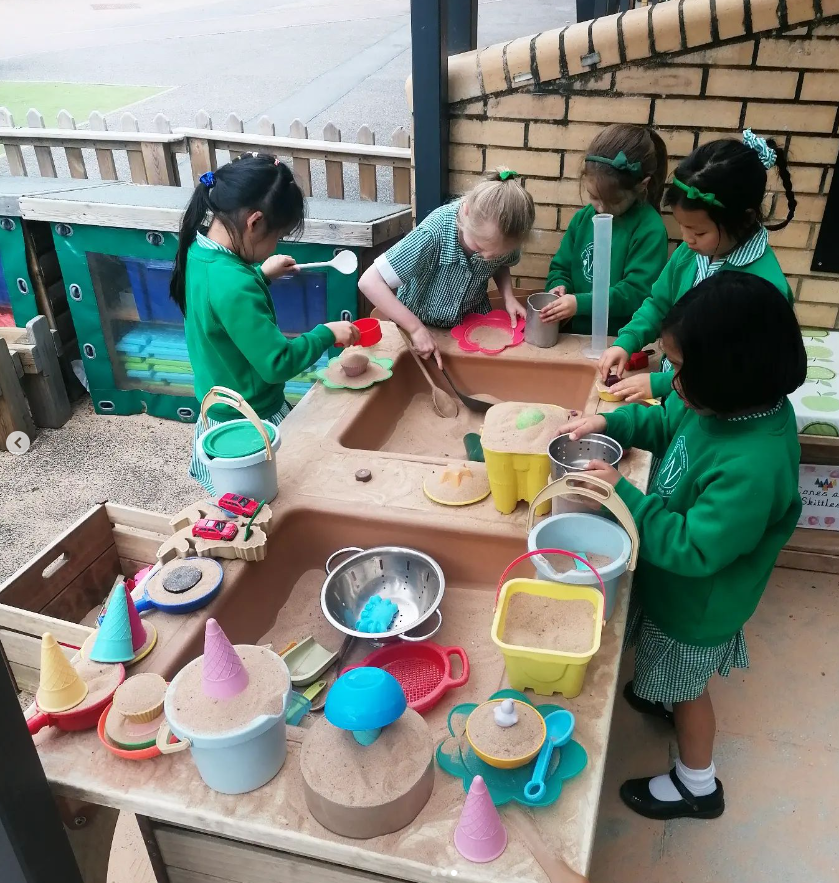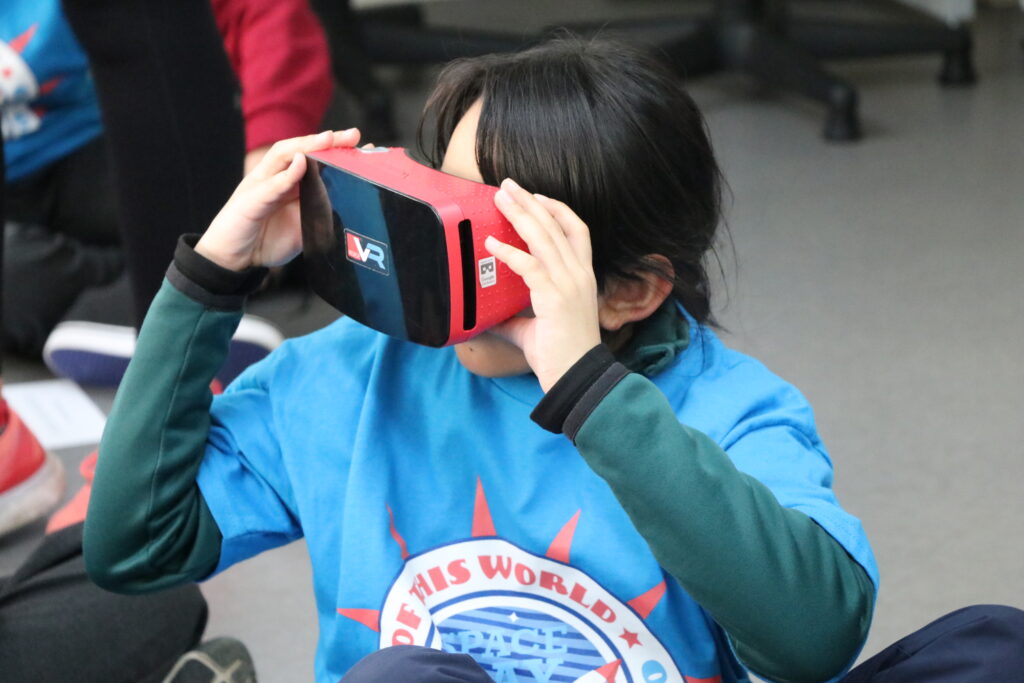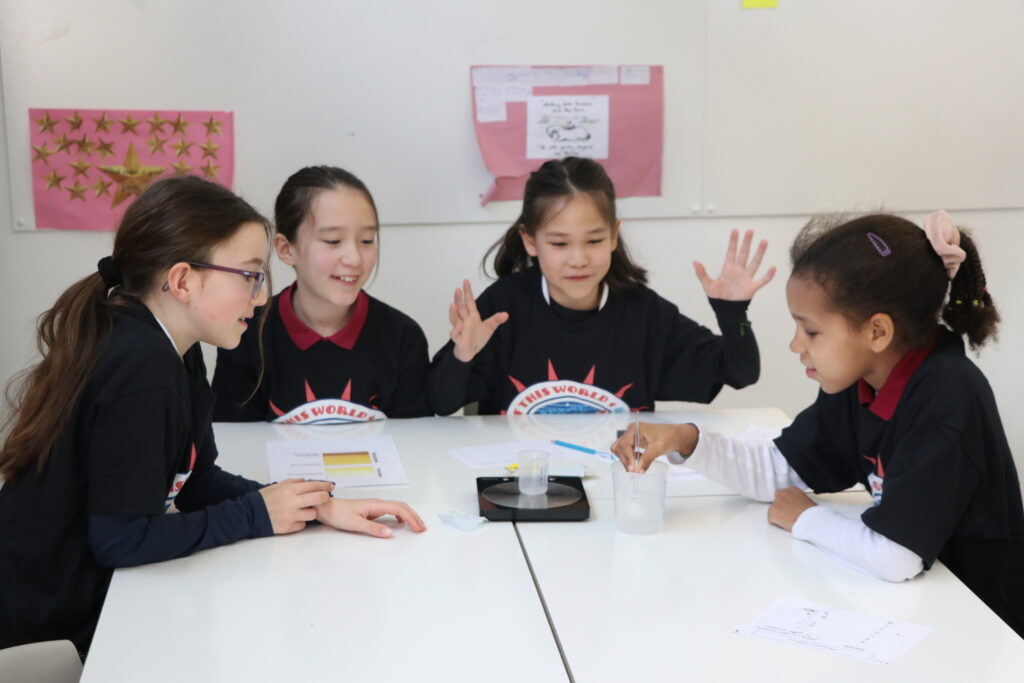Head of Juniors Claire Boyd discusses PLAY, a year on from our initiative to put playfulness at the heart of learning at Wimbledon High.
A year has passed since we welcomed teachers and school leaders from all over the country to our one-day conference, Joy of Childhood: Creating Spaces for Play and Playfulness. As we look back over the subsequent twelve months, what can we learn about the impact of our work championing and celebrating all things playful?
Michael Rosen is wise beyond words
For many of the delegates who attended the conference, poet, author, and all-round national treasure, Michael Rosen, was the main attraction. With a body of work that includes over 90 books for teachers, parents, and children, many of those who arrived on that dark, cold morning had grown up reading—and adoring—titles like We’re Going on a Bear Hunt, Sticky McStickStick, and A Big Cuddle. Many more had also been inspired by his progressive and passionate essays on children’s literature and reading processes as part of their teacher training.
The audience was in raptures as he recited some of his most famous poems alongside more sobering cautionary tales about the dangers of growing up in environments where play exists only in the margins. As Rosen read extracts from his book, Different Kinds of Love: A Story of Life, Death & the NHS, a memoir and reflection on his experiences of contracting Covid and recovering from a month in an induced coma, there was not a dry eye in the house. He mused on the “power of community and the indomitable spirits of the people who keep us well,” and it was clear that much of his recovery was the result of a lifelong commitment to harnessing the art of playful irreverence. No one could argue with his final words in praise of play that day, “No one individual is in charge of their destiny, and a playful outlook can be very helpful and comforting with this.”
Playful approaches help connections grow & spark innovation.

Our passion for playfulness—ever more strengthened over the last year—has inspired us to take a fresh look at the opportunities for connection-building across different domains and seeking out new possibilities for pedagogical innovation. Already keen advocates of a STEAM+ agenda (interdisciplinary approaches to teaching Science, Technology, Engineering, Arts, and Maths), when a new research opportunity with the Primary Science Teaching Trust (PSTT) arose, it made sense to jump straight in and push our playful boundaries a little further.
The result has been the new, hot-off-the-press publication, Sketchbook Science: A Primary Science Teaching Trust Resource. Rooted in taking children’s natural playful instincts as a starting point, the project’s rationale “encourages the recognition that creativity and curiosity belong to both science and art, [spurring] children on to consider more broadly their own identities as scientists and artists.”
The brainchild of Alex Farrer (Head of Junior School Science & PSQM Regional Lead) and Isabelle Dubois (Head of Junior School Art & Design), Sketchbook Science brings together eight projects that combine learning in both science and art. It teaches substantive concepts relating to the biological, chemical, and physical sciences as well as offering opportunities to develop disciplinary knowledge inspired by the work of great artists and designers, including Katsushika Hokusai, Jackson Pollock, and Yayoi Kusama.
Developed here at WHS and trialed in partnership schools across the country, Sketchbook Science was launched earlier this month at The Association of Science Education annual conference at the University of Nottingham. A free-to-download resource, we hope Sketchbook Science’s reach will ignite playful approaches in classrooms nationwide.
The neuroscience of play holds the answer for teachers and parents.
The compelling evidence Prof Sam Wass (Baby DevLab & The Secret Life of 4 & 5 Year Olds) presented at our day of play has prompted further collaboration and staff training in this vital area. It is only with a deepening understanding of the way neuroscience and child psychology interleave that we can ensure the climate of playfulness we cultivate in our school purposely supports schema-building, synapse strengthening, and cognitive development as well as the appropriate age-and-stage emotional self-regulation that allows children to learn alongside one another and grow together.

We have now established an ongoing partnership with Sam’s new venture, Nest Kids, and Gemma Goldenberg has delivered whole staff training on what happens in the child brain when the sympathetic and parasympathetic nervous system is triggered at school. This has given way to the creation of the Wimbledon Way, a whole-school approach to supporting emotional self-regulation and resolving conflict; both of which are vital in building spaces where the highs and lows of the play cycle can be navigated with confidence.
With firsthand teaching and parenting experience, alongside her status as a qualified psychologist, Gemma will be returning to WHS next term to offer practical tips and advice for parents and carers who are keen to support their child with healthy emotional regulation at home. What you can expect from the Wimbledon Way will also be the focus of our in-person, Spring Term Coffee Mornings for Junior School parents.
You’re never too old to play.
Central to our adoption of playful scholarship has also been a belief in the hard-wired connections between playfulness and intellectual curiosity. Rather than seeing the process of education as a process of information transmission and knowledge transference from teacher to pupil, Wimbledon High is committed to inspiring our girls to go out into the world to make a difference as a result of an education that blends scholarship and resilience with creativity. Over the last year, we have strengthened the golden thread of PLAY through the Senior School, building a continuum of playful scholarship that runs from Early Years to Sixth Form.
This foregrounding of dexterous thought in students is now driving the classroom experience across key stages, with playful approaches that demonstrate that learning is not binary; a scholar who is flexible in their thinking is one that is less likely to be offended, canceled, or afraid to share their opinion.
The future of playful scholarship continues to look bright at WHS. A year on from our flagship conference, our belief in the value of play and the virtues of playfulness prompt us to challenge the orthodoxies associated with traditional exam preparation and performance.

